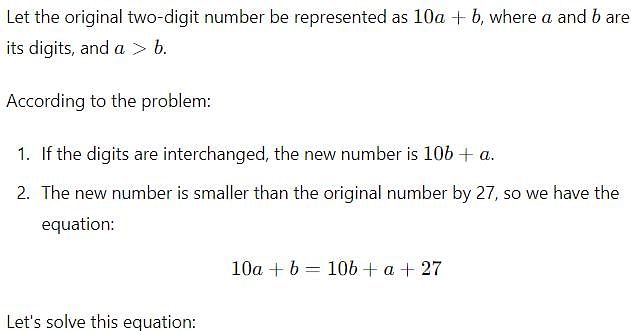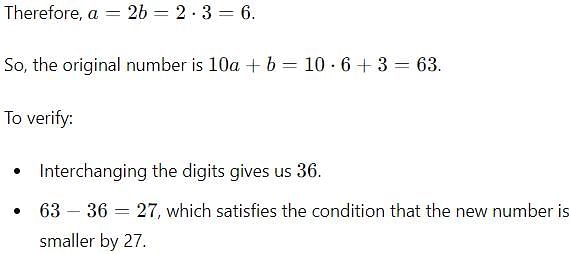Quant Exam > Quant Questions > If the positions of the digits of a two digit...
Start Learning for Free
If the positions of the digits of a two digit number are interchanged, the number obtained is smaller than the original number by 27. If the digits of the number are in the ratio of 1:2, what is the original number?
- a)16
- b)32
- c)63
- d)48
- e)Can not be determined
Correct answer is option 'C'. Can you explain this answer?
| FREE This question is part of | Download PDF Attempt this Test |
Verified Answer
If the positions of the digits of a two digit number are interchanged,...



Thus, the original number is 63.
Most Upvoted Answer
If the positions of the digits of a two digit number are interchanged,...
Given:
- The digits of a two-digit number are in the ratio of 1:2
- If the positions of the digits are interchanged, the number obtained is smaller than the original by 27.
To find: the original number.
Solution:
Let the two digits of the number be x and 2x (since they are in the ratio of 1:2)
Original number = 10x + 2x = 12x
When the positions of the digits are interchanged, the new number becomes 10(2x) + x = 20x + x = 21x
According to the given condition, the new number is smaller than the original number by 27.
So, we can write the equation as: 12x - 27 = 21x
Simplifying the equation, we get:
9x = 27
x = 3
So, the two digits of the original number are 3 and 6 (in the ratio of 1:2)
Therefore, the original number = 12x = 12(3) = 36
Hence, the correct answer is option (c) 63.
- The digits of a two-digit number are in the ratio of 1:2
- If the positions of the digits are interchanged, the number obtained is smaller than the original by 27.
To find: the original number.
Solution:
Let the two digits of the number be x and 2x (since they are in the ratio of 1:2)
Original number = 10x + 2x = 12x
When the positions of the digits are interchanged, the new number becomes 10(2x) + x = 20x + x = 21x
According to the given condition, the new number is smaller than the original number by 27.
So, we can write the equation as: 12x - 27 = 21x
Simplifying the equation, we get:
9x = 27
x = 3
So, the two digits of the original number are 3 and 6 (in the ratio of 1:2)
Therefore, the original number = 12x = 12(3) = 36
Hence, the correct answer is option (c) 63.
Free Test
FREE
| Start Free Test |
Community Answer
If the positions of the digits of a two digit number are interchanged,...
Given:
- The digits of a two digit number are in the ratio of 1:2
- If the positions of the digits are interchanged, the number obtained is smaller than the original number by 27.
To find: The original number
Solution:
Let the digits of the number be x and 2x. Therefore, the original number will be 10x + 2x = 12x.
When the positions of the digits are interchanged, the new number will be 10(2x) + x = 20x + x = 21x.
It is given that the new number is smaller than the original number by 27. So, we can write an equation as:
12x - 21x = 27
-9x = 27
x = -3
This value of x is not possible since the ratio of the digits is 1:2 and both digits have to be positive.
Therefore, the answer cannot be determined.
However, we made an error in the calculation since we have assumed that the original number is greater than the new number. This is not necessarily true. Let's try again by assuming the original number is smaller than the new number.
Let the digits of the number be 2x and x. Therefore, the original number will be 10(2x) + x = 21x.
When the positions of the digits are interchanged, the new number will be 10(x) + 2x = 12x.
It is given that the new number is smaller than the original number by 27. So, we can write an equation as:
21x - 12x = 27
9x = 27
x = 3
Therefore, the digits of the number are 6 and 3. The original number is 21x = 63.
Hence, the correct answer is option (c) 63.
- The digits of a two digit number are in the ratio of 1:2
- If the positions of the digits are interchanged, the number obtained is smaller than the original number by 27.
To find: The original number
Solution:
Let the digits of the number be x and 2x. Therefore, the original number will be 10x + 2x = 12x.
When the positions of the digits are interchanged, the new number will be 10(2x) + x = 20x + x = 21x.
It is given that the new number is smaller than the original number by 27. So, we can write an equation as:
12x - 21x = 27
-9x = 27
x = -3
This value of x is not possible since the ratio of the digits is 1:2 and both digits have to be positive.
Therefore, the answer cannot be determined.
However, we made an error in the calculation since we have assumed that the original number is greater than the new number. This is not necessarily true. Let's try again by assuming the original number is smaller than the new number.
Let the digits of the number be 2x and x. Therefore, the original number will be 10(2x) + x = 21x.
When the positions of the digits are interchanged, the new number will be 10(x) + 2x = 12x.
It is given that the new number is smaller than the original number by 27. So, we can write an equation as:
21x - 12x = 27
9x = 27
x = 3
Therefore, the digits of the number are 6 and 3. The original number is 21x = 63.
Hence, the correct answer is option (c) 63.

|
Explore Courses for Quant exam
|

|
Similar Quant Doubts
If the positions of the digits of a two digit number are interchanged, the number obtained is smaller than the original number by 27. If the digits of the number are in the ratio of 1:2, what is the original number?a)16b)32c)63d)48e)Can not be determinedCorrect answer is option 'C'. Can you explain this answer?
Question Description
If the positions of the digits of a two digit number are interchanged, the number obtained is smaller than the original number by 27. If the digits of the number are in the ratio of 1:2, what is the original number?a)16b)32c)63d)48e)Can not be determinedCorrect answer is option 'C'. Can you explain this answer? for Quant 2024 is part of Quant preparation. The Question and answers have been prepared according to the Quant exam syllabus. Information about If the positions of the digits of a two digit number are interchanged, the number obtained is smaller than the original number by 27. If the digits of the number are in the ratio of 1:2, what is the original number?a)16b)32c)63d)48e)Can not be determinedCorrect answer is option 'C'. Can you explain this answer? covers all topics & solutions for Quant 2024 Exam. Find important definitions, questions, meanings, examples, exercises and tests below for If the positions of the digits of a two digit number are interchanged, the number obtained is smaller than the original number by 27. If the digits of the number are in the ratio of 1:2, what is the original number?a)16b)32c)63d)48e)Can not be determinedCorrect answer is option 'C'. Can you explain this answer?.
If the positions of the digits of a two digit number are interchanged, the number obtained is smaller than the original number by 27. If the digits of the number are in the ratio of 1:2, what is the original number?a)16b)32c)63d)48e)Can not be determinedCorrect answer is option 'C'. Can you explain this answer? for Quant 2024 is part of Quant preparation. The Question and answers have been prepared according to the Quant exam syllabus. Information about If the positions of the digits of a two digit number are interchanged, the number obtained is smaller than the original number by 27. If the digits of the number are in the ratio of 1:2, what is the original number?a)16b)32c)63d)48e)Can not be determinedCorrect answer is option 'C'. Can you explain this answer? covers all topics & solutions for Quant 2024 Exam. Find important definitions, questions, meanings, examples, exercises and tests below for If the positions of the digits of a two digit number are interchanged, the number obtained is smaller than the original number by 27. If the digits of the number are in the ratio of 1:2, what is the original number?a)16b)32c)63d)48e)Can not be determinedCorrect answer is option 'C'. Can you explain this answer?.
Solutions for If the positions of the digits of a two digit number are interchanged, the number obtained is smaller than the original number by 27. If the digits of the number are in the ratio of 1:2, what is the original number?a)16b)32c)63d)48e)Can not be determinedCorrect answer is option 'C'. Can you explain this answer? in English & in Hindi are available as part of our courses for Quant.
Download more important topics, notes, lectures and mock test series for Quant Exam by signing up for free.
Here you can find the meaning of If the positions of the digits of a two digit number are interchanged, the number obtained is smaller than the original number by 27. If the digits of the number are in the ratio of 1:2, what is the original number?a)16b)32c)63d)48e)Can not be determinedCorrect answer is option 'C'. Can you explain this answer? defined & explained in the simplest way possible. Besides giving the explanation of
If the positions of the digits of a two digit number are interchanged, the number obtained is smaller than the original number by 27. If the digits of the number are in the ratio of 1:2, what is the original number?a)16b)32c)63d)48e)Can not be determinedCorrect answer is option 'C'. Can you explain this answer?, a detailed solution for If the positions of the digits of a two digit number are interchanged, the number obtained is smaller than the original number by 27. If the digits of the number are in the ratio of 1:2, what is the original number?a)16b)32c)63d)48e)Can not be determinedCorrect answer is option 'C'. Can you explain this answer? has been provided alongside types of If the positions of the digits of a two digit number are interchanged, the number obtained is smaller than the original number by 27. If the digits of the number are in the ratio of 1:2, what is the original number?a)16b)32c)63d)48e)Can not be determinedCorrect answer is option 'C'. Can you explain this answer? theory, EduRev gives you an
ample number of questions to practice If the positions of the digits of a two digit number are interchanged, the number obtained is smaller than the original number by 27. If the digits of the number are in the ratio of 1:2, what is the original number?a)16b)32c)63d)48e)Can not be determinedCorrect answer is option 'C'. Can you explain this answer? tests, examples and also practice Quant tests.

|
Explore Courses for Quant exam
|

|
Suggested Free Tests
Signup for Free!
Signup to see your scores go up within 7 days! Learn & Practice with 1000+ FREE Notes, Videos & Tests.


















